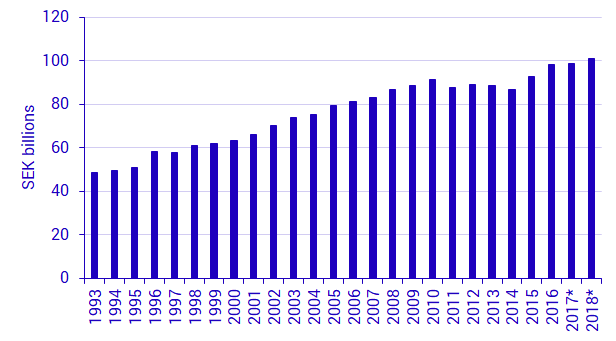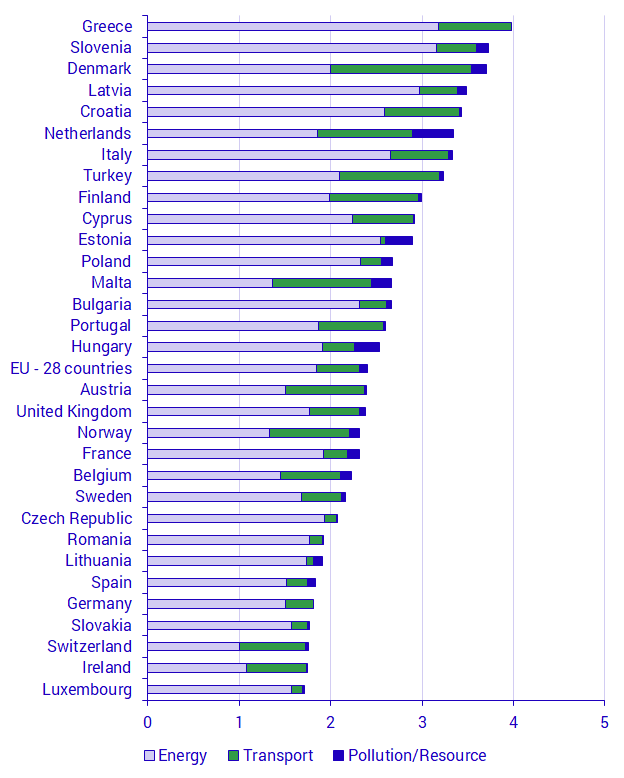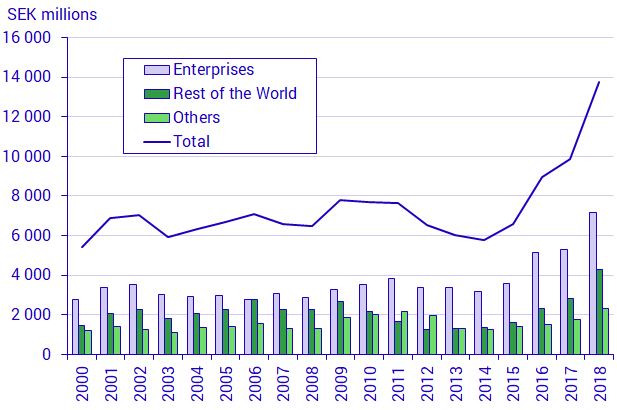Environmentally motivated subsidies and preliminary environmental tax revenue 2018
Environmental tax revenue continued to increase in 2018
Statistical news from Statistics Sweden 2019-05-16 9.30
Revenue from environmental taxes continued to increase in 2018 and amounted to SEK 101 billion. This increase is due to increased revenue from energy taxes and new environmental taxes on air travel and chemicals. Environmentally motivated subsidies also increased and amounted to SEK 14 billion in 2018.
Environmental tax revenue to the Government amounted to SEK 101 billion, according to preliminary statistics. This is an increase of SEK 2 billion from 2017, which corresponds to an increase of 2 percent. Following several years of decreasing or static environmental tax revenue in the period 2011–2014, revenue has had an upward trend. Environmental tax revenue in 2018 was the largest ever since the beginning of the time series in 1993.
In 2018, revenue increased from both energy tax on fuels and energy tax on electricity, by SEK 1.6 billion each. At the same time, the tax on the thermal effect of nuclear power was phased out, which contributed downward by SEK 2.6 billion. Revenue from the carbon dioxide tax also decreased by SEK 0.5 billion.
The reason for the continued increase in 2018 in total environmental tax revenue is an increase in the tax on certain chemical substances in electronics, as well as the new tax on air travel. The tax on air travel aims to decrease the climate impact from aviation. In 2018, the tax on air travel generated SEK 1.3 billion in revenue. The tax on certain chemicals was introduced on 1 July 2017, which means 2018 is the first year that tax revenue is based on a whole year. Revenue from the tax on certain chemicals amounted to SEK 1.4 billion in 2018.

*Figures for 2017 and 2018 are preliminary.
Environmental taxes in the EU
The elections to the European Parliament will take place on 26 May in Sweden. However, what taxes apply and the amount of tax paid by EU citizens is decided at national level. The size and significance of environmental taxes varies in different countries.
Statistics on environmental taxes are available in all EU Member States and the taxes are contained in the categories energy taxes, transport taxes, pollution taxes and resource taxes. Comparisons of environmental tax revenue between countries are often made as a share of total tax revenue or GDP, to adjust for the countries’ different sizes. Greece, Slovenia and Denmark were the countries with highest environmental taxes as a share of GDP in 2017. Sweden is among the countries with lower environmental taxes as a share of GDP, at 2.2 percent.
A low or high share can depend on several factors. Environmental tax revenue depends on what environmental taxes apply, tax rates, exceptions in different sectors, as well as the use of the tax base. When the consumption of, for example, fossil fuels decreases, tax revenue also decreases. Even though Sweden often has high tax rates in relation to other countries on, for example, carbon emissions, other factors may also have an impact. Factors can include low tax incomes from transport taxes and a low share of fossil fuels in final consumption.

Environmentally motivated subsidies
In 2018, environmentally motivated subsidies amounted to SEK 13.8 billion. This is an increase of 40 percent compared with 2017 and the highest level since the beginning of the times series in 2000. The largest contribution comes from the introduction of climate change investments, which are to be used at local and regional level to reduce greenhouse gas emissions.
Environmentally motivated subsidies include transactions that help reduce climate and environmental impact and improve natural resources management. Subsidies are increasing in several areas. In the agricultural sector, subsidies are increasing following the introduction of “greening” in 2015. International aid has also increased since efforts within the 2030 Agenda began. Actions for renewable energy and energy efficiency continue to increase, including national contributions to the municipalities for the establishment of wind power.
These subsidies, that is, Government contributions for investments and consumption, are allocated to different actors, both nationally and internationally. Subsidies to enterprises, non-profit organisations and other government agencies have increased substantially since 2017 and account for 83 percent of total subsidies. The subsidies have been mostly designated for environmentally related improvements in agriculture and energy, and environmentally related research, for which Swedish enterprises have received support. Subsidies to the rest of the world, in the form of aid and international cooperation on the environment and climate, have increased from SEK 1.7 billion in 2017 to SEK 2.3 billion in 2018.

The group “Others” contain support to households, public sector and non-profit organisations.
Environmentally related subsidies revised
In 2019, a revision of the statistics was conducted. Within the group of international aid, some appropriations were removed for 2008–2017. These appropriations focused on reform cooperation and economic and socially sustainable development. This has led to slower development of international aid in the statistics compared to previously published statistics.
Definitions and explanations
Environmental taxes
The definition of an environmental tax that Statistics Sweden applies was developed by Eurostat and the OECD. The term is included in the global SEEA Central Framework statistical standards and enables comparative studies between different countries. The definition is:
“...it has been chosen to single out the tax base that seems to have a particular environmental relevance, and to consider all taxes levied on these tax bases as environmentally related regardless of motives behind their introduction, their names etc.”
Consequently, based on this definition, the tax base determines whether or not a tax is defined as environmental.
Statistics Sweden has presented statistics on environmental taxes since 1993.
Environmentally motivated subsidies
Environmentally motivated subsidies are defined in accordance with the SEEA Central Framework statistical standards for environmental accounts. The definition that applies in Statistics Sweden’s environmental accounts is informed by the subsidy objective. Therefore, the definition used in the environmental accounts is broader than the one used in the national accounts, as the environmental accounts also include capital and current transfers and social benefits in kind.
For the environmental accounts, the primary source for the subsidy objective has been the Government’s Budget Bills for various years. These statistics are derived from the National Financial Management Authority’s calculations of the central government budget’s outcome, in which transactions are traced back to the government appropriations from which they came. In 2015, Statistics Sweden carried out a development project that reviewed the methodology of the statistics.
Statistics Sweden has presented statistics on environmentally motivated subsidies since 2000.
Statistical Database
More information is available in the Statistical Database
Feel free to use the facts from this statistical news but remember to state Source: Statistics Sweden.
